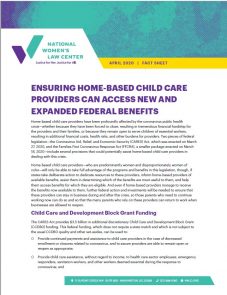 Home-based child care providers have been profoundly affected by the coronavirus public health crisis—whether because they have been forced to close, resulting in tremendous financial hardship for the providers and their families, or because they remain open to serve children of essential workers, resulting in additional financial costs, health risks, and other burdens for providers. Two pieces of federal legislation—the Coronavirus Aid, Relief, and Economic Security (CARES) Act, which was enacted on March 27, 2020, and the Families First Coronavirus Response Act (FFCRA), a smaller package enacted on March 18, 2020—include several provisions that could potentially assist home-based child care providers in dealing with this crisis.
Home-based child care providers have been profoundly affected by the coronavirus public health crisis—whether because they have been forced to close, resulting in tremendous financial hardship for the providers and their families, or because they remain open to serve children of essential workers, resulting in additional financial costs, health risks, and other burdens for providers. Two pieces of federal legislation—the Coronavirus Aid, Relief, and Economic Security (CARES) Act, which was enacted on March 27, 2020, and the Families First Coronavirus Response Act (FFCRA), a smaller package enacted on March 18, 2020—include several provisions that could potentially assist home-based child care providers in dealing with this crisis.
Home-based child care providers—who are predominantly women and disproportionately women of color—will only be able to take full advantage of the programs and benefits in this legislation, though, if states take deliberate action to dedicate resources to these providers, inform home-based providers of available benefits, assist them in determining which of the benefits are most useful to them, and help them access benefits for which they are eligible. And even if home-based providers manage to receive the benefits now available to them, further federal action and investments will be needed to ensure that these providers can stay in business during and after this crisis, so those parents who need to continue working now can do so and so that the many parents who rely on these providers can return to work when businesses are allowed to reopen.

